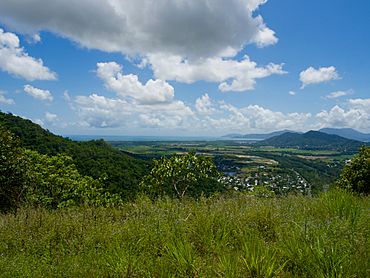Kuranda National Park facts for kids
Quick facts for kids Kuranda National ParkQueensland |
|
|---|---|
|
IUCN Category II (National Park)
|
|

Kuranda National Park, December 2015
|
|
| Nearest town or city | Kuranda |
| Area | 27,100 hectares (67,000 acres) |
| Managing authorities | Queensland Parks and Wildlife Service |
| Website | Kuranda National Park |
| See also | Protected areas of Queensland |
Kuranda National Park is a special place in Far North Queensland, Australia. It's a national park that helps protect important natural areas. This park is part of the amazing Wet Tropics World Heritage Area. This means it's recognized globally for its unique nature.
The park is like a safe highway for animals, called a wildlife corridor. It has two main types of forests: thick rainforests and open eucalypt forests. Many people love visiting Kuranda National Park. They enjoy walking, riding mountain bikes, and going on four-wheel drive adventures.
Contents
Amazing Wildlife
Kuranda National Park is home to some very special animals. It helps protect them and their homes.
Endangered Animals
One of the most famous animals here is the endangered southern cassowary. This large, colorful bird cannot fly. It is very important for spreading seeds in the rainforest. The park also protects the rare Lumholtz's tree-kangaroo. This unique kangaroo lives in trees and is only found in this part of Australia.
Other Unique Birds
You might also spot the beautiful Victoria's riflebird. This bird is known for its shiny black feathers and amazing dance moves. The male performs a special dance to attract a mate.
Plant Health Concerns
Unfortunately, a plant disease called Myrtle rust has been found in the park. This disease can harm native plants, especially those in the myrtle family. Park rangers work to keep the plants healthy.
Where is Kuranda National Park?
This park covers a huge area of 27,100 hectares (67,000 acres). That's about the size of 27,100 football fields! It's full of mountains and tropical forests. You can find it north-west of Cairns, a big city in Queensland.
Neighboring Parks and Towns
Kuranda National Park is surrounded by other important natural areas. To its north is Mowbray National Park. To the north-east, you'll find Macalister Range National Park. On its eastern side is Smithfield Conservation Park. To the south, it connects with Barron Gorge National Park. In the west, it borders Kuranda West Forest Reserve.
The park stretches across parts of several towns and areas. These include Mona Mona, Mount Molloy, Macalister Range, and Kuranda. It's also part of the Cairns Region and the Mareeba Shire local government areas.
River Systems
The park is important for several river systems. It covers some of the eastern parts of the Mitchell River water catchment. It also includes parts of the Barron River catchment. Plus, it protects several small creeks that flow into the coast north of Cairns.
Visiting the Park
It's easy to visit Kuranda National Park, but you need to be aware of the weather.
How to Get There
You can get to the park using Black Mountain Road. This road turns off from the Kennedy Highway near the town of Kuranda.
Road Conditions
It's important to know that Black Mountain Road can close. This usually happens during the wetter months. It also closes after heavy rain to keep visitors safe. Always check road conditions before you go.
Walking Tracks
The park has one main long-distance walking track. It's called the Twin Bridges track. This track is 18 kilometers long, which is about 11 miles, and it's a one-way path. It's a great way to explore the park's beautiful forests on foot.
 | Audre Lorde |
 | John Berry Meachum |
 | Ferdinand Lee Barnett |


